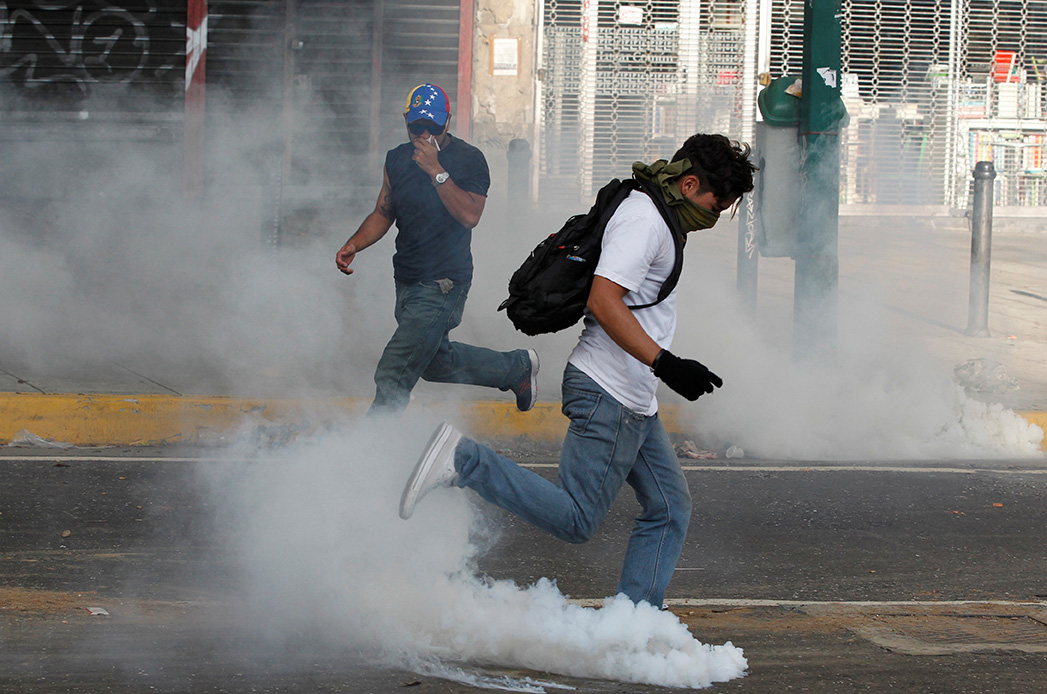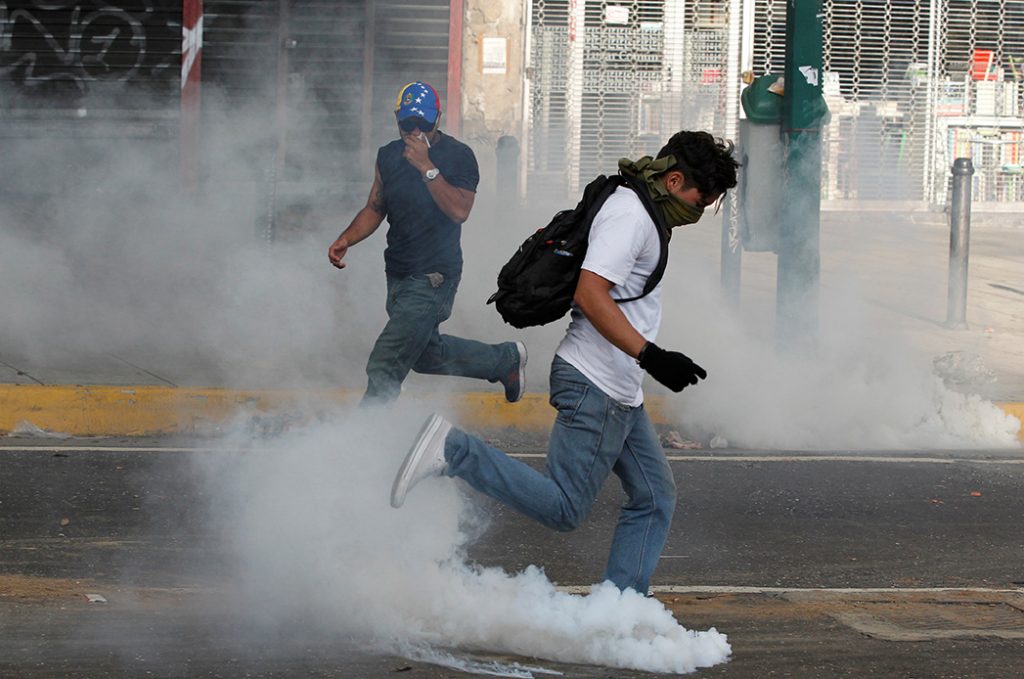 Jorge Quiroga does not believe that the presidential elections scheduled to be held in Venezuela on April 22 will be free or fair. In fact, he contends, “they’re not elections.”
Jorge Quiroga does not believe that the presidential elections scheduled to be held in Venezuela on April 22 will be free or fair. In fact, he contends, “they’re not elections.”
The former president of Bolivia is not alone in that opinion.
Venezuela’s opposition coalition has decided to boycott the vote saying the system is rigged in Venezuelan President Nicolás Maduro’s favor. That decision paves the way to the “coronation of a North Korea in the Caribbean,” Quiroga said at the Atlantic Council on February 21.
Poised to extend his term in office by another six years, Maduro has driven Venezuela to the worst economic and humanitarian crisis in the history of Latin America’s petrol powerhouse. Corruption and mismanagement of public funds by the political elites have resulted in astronomical inflation rates throughout Venezuela such that basic food and medicine are unaffordable and scarce.
“In the midst of the best oil prices in the world, turning that country into what it is become requires truly magic,” said Quiroga. “It is the Midas touch in reverse.”
While the United States and the European Union (EU) have imposed sanctions on the Venezuelan government and individuals within Maduro’s regime in response to the undemocratic turn in the country, it has not deterred the leaders cooped up in Caracas. Maduro’s Constituent Assembly called for accelerated elections to be held in April, flouting democratic conventions and manipulating the system to assure his victory.
Venezuela’s opposition, divided by internal conflicts and dismayed by the sham gubernatorial and mayoral elections last fall, announced on February 21 that they would not participate in the upcoming presidential election. While this move allows them to make a statement of their condemnation, it opens the door to Maduro’s uncontested win.
Gerardo de Icaza, acting secretary for strengthening democracy at the Organization of American States (OAS), described the undemocratic conditions skewing the electoral playing field in Venezuela. He joined Luis Lander, president of the Observatorio Electoral Venezolano; Eugenio Martínez, a journalist at Diario Las Américas; and Jennifer McCoy, a distinguished professor of political science at Georgia State University, to discuss the circumstances of the election, and what might be done. Tracy Wilkinson, a reporter at the Washington, DC, bureau of the Los Angeles Times, moderated the discussion.
According to de Icaza, the seventy-four-day deadline for this election is “certainly below regional standards.” Further, Maduro’s government has imprisoned any potential opposing candidates that could harm his chances at the polls. “If we are picking and choosing opponents,” de Icaza said, “that’s a far cry from a fair election.” Finally, Venezuelans living abroad were given a forty-eight-hour window to register to vote. This will naturally alter the outcome as most Venezuelans living abroad would not vote for Maduro, said de Icaza.
Maduro’s officials “have put in place all the systems that allow them to steal elections,” said Quiroga, adding displacement of voters and hunger blackmail to de Icaza’s list.
While international bodies such as the OAS and the United Nations (UN) typically monitor elections, they “never do them unless they are invited several months in advance,” said Lander. Therefore, he said, while the OAS would be the group to monitor the Venezuelan election, they cannot do so within the tight timeframe.
He noted that “2015 was the point at which this electoral process broke down,” in Venezuela. Since then the crisis has only worsened.
According to Jason Marczak, director of the Atlantic Council’s Adrienne Arsht Latin America Center, “there are no checks and balances anymore.” He described how the elections that took place in 2015 were the last dregs of democracy in the Maduro regime. Now, power has been seized completely, and there is no doubt that Maduro will emerge from the April 22 vote with a tighter grip on the starving nation.
In his opening remarks, Marczak discussed the results of a poll conducted by the Atlantic Council to determine the trending political opinions among voters in Venezuela. The results determined a stark lack of trust in institutions and largely unfavorable opinions of Maduro. While these conditions will do little to change the state of politics in Venezuela, they do have far-reaching ramifications, Marczak cautioned.
“What is happening right now [is] resulting in not only domestic suffering but international ramifications,” said Marczak. He added: “The regional and global implications of the crisis are only now beginning to be grasped.”
Ahead of the panel, Marczak joined Camilo Reyes, ambassador of Colombia to the United States, to discuss the dire situation in Venezuela and its implications for the neighborhood. Reyes described the dire conditions not only for Venezuela’s neighbors, such as Colombia, but for other countries in the region as well. In particular, the refugee crisis has put a massive strain on countries such as Colombia, which has taken in 600,000 Venezuelan refugees—and those are only the ones who were documented.
Many refugees pass through Colombia on their way to Ecuador, Peru, and increasingly the Caribbean. This “will start affecting in a very aggressive way the Caribbean islands,” said Reyes.
He called for a coordinated international effort first to address immediate humanitarian needs, providing food and vaccines to those in need. Next, there should be an effort to rebuild Venezuela’s democratic institutions. To reach a point where that is possible, however, Reyes said: “We have to be able to push forward national and individual sanctions.” A number of officials within Maduro’s government are already under US and EU sanctions, and there are more overarching sanctions for the government as a whole. According to Reyes, “they are slow and it is difficult to see immediate results, but we know they do have results.”
Further, he said, “national sanctions must be reflected in the rejection by all countries of their relationships with Venezuela.” Reyes also called for a comprehensive rejection of all actions taken by Maduro regime. “They do not reflect Venezuelans… and they do not reflect international standards,” he said.
“The global order can be altered with the implosion of Venezuela,” Reyes cautioned, calling for increased action from the international community to address the situation.
Quiroga put forth a list of necessary actions to bring the Maduro regime to heel.
He echoed Reyes’ call for coordinated sanctions as a necessary step to increase pressure. He also emphasized the importance of referring the regime to the International Criminal Court as a measure which, symbolic though it may be, practically hurts Maduro and his government. Seizures are another important step to be taken, according to Quiroga. “Everybody knows where these crooks have their bank accounts and assets,” he said, adding that international authorities should seize those assets.
Leveraging international institutions and multilateral bodies such as the OAS will also help, said Quiroga. He claimed that a coordinated approach by all global actors will allow those nations involved to take similar steps regarding their diplomatic relations with Venezuela. In this way, they can take preventive actions.
International authorities can also capitalize on their ability to expel individuals linked to the regime, aiding its corruption, but living in other countries. According to Quiroga, they must not be allowed to do so, and cracking down on them will increase the pressure on Caracas.
With regard to the migration crisis, he said, all stakeholders need to pitch in. Much as regional players and European nations took in millions of Syrian refugees, countries in the Western hemisphere must do the same. “If we ask any one country to take all the Venezuelans,” he said, “no one can.” Currently, according to Quiroga, more refugees come from Venezuela than Syria.
Finally, actions need to target Venezuela’s last remaining asset: oil. Quiroga called for the international community to begin a dialogue around what must be done with the stores of oil from Venezuela.
He emphasized the need to act quickly, particularly when faced with sham elections and the extended rule of a ruthless leader while Venezuelan people continue to suffer. “The time to do all these things is now,” Quiroga said, “otherwise we will have to be sad about the fact that a North Korea was installed in the Caribbean under our watch.”
Rachel Ansley is assistant director of editorial content at the Atlantic Council.
Image: Protesters clash with police during a rally to demand for a referendum to remove Venezuelan President Nicolás Maduro in Caracas, Venezuela, on September 1. (Reuters/Christian Veron)
